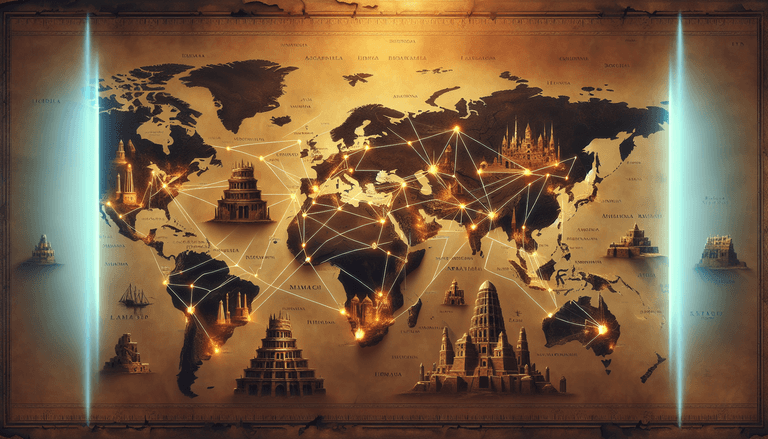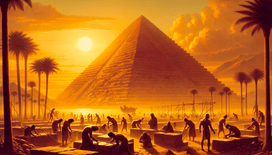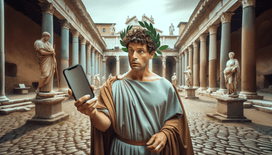Ah, Alexander the Great, the original globetrotter whose Travelodge lifestyle involved conquering cities instead of collecting travel points. But what if he wasn't forever getting lost on his way to the latest siege? Imagine if, instead of relying on friendly nudge-nudge-wink-wink locals and slightly inaccurate maps drawn on papyrus, he had access to the godsend that is GPS. Let's embark on a sat-nav-powered journey to see how this historical saga might have unfolded!
Mind the Gap, Alexander!
So, it's 334 BC and young Alexander is brimming with ambition and an appetite for expansion that could rival even the largest All-You-Can-Eat empire buffets. He kicks off his Eastern jolly in Asia Minor, where standard operational procedure naturally involves conquering a couple of cities before breakfast. With GPS in hand, however, he'd uncover the most efficient routes between Persian encampments, perhaps cheerily opting to take the scenic route through Cappadocia without worrying about dead ends or impromptu skirmishes.
No longer would he need to inquire at local taverns for directions, only to be misled by unhelpful regulars enjoying a goblet too many. "Turn left at the large gazelle," he'd hear instead from his now-invaluable guide, cutting out the usual miles' worth of guessing and any impulse cavalry-sprees prompted by alleyway confusion.
The Quest for Perfectly-Timed Arrivals
Alexander was known for his speedy army manoeuvres, able to appear at the enemy’s citadel with all the surprise of an unannounced mother-in-law visit. However, with GPS technology at his behest, he'd reach new heights of military efficiency. Imagine the delight at never getting sidetracked by treacherous terrain, thanks to real-time traffic updates courtesy of satellite technology. "Avoid the landslide prone area in your route," is infinitely more helpful than fumbling in the dark or battling morose weather predicting priests.
This newfound sense of punctuality might also have improved his personal well-being. Picture leisurely late-night victories instead of frenzied last-minute sprints up to Macedonian fortresses. The life of Alexander with a little more downtime, perhaps finally enjoying some of the vistas he so vociferously conquered.
Clicking 'Recalculate' on History
With his trusty GPS, Alexander could savour victories with little concern over straying too far into unfamiliar territories. Decisions that once required hours of deliberation could be made in the blink of an eye. Imagine bypassing battle altogether should the Persians be outnumbered and outflanked before they'd even scramble for reinforcements.
But technology isn't infallible, what happens when technical glitches rear their ugly head? Poor signal could result in a detour to an unscheduled location, turning an intended march towards Egypt into an unexpected romp through the Greek islands. Cue the mental image of the prematurely grey Alexander, shouting "Recalculating!" into the night as his army meander into yet another uncharted seaside retreat.
Alexander's Trip Advisor Rating
In this alternative narrative, not only would Alexander's logistical might have sharpened, but his itinerary would read like a millennial's dream. With the potential for pinpointing every must-see location, he'd skip poorly-rated battlefield duds, maybe stopping only for historically significant selfies with the Parthenon before moving on.
And, surely, Alexander would spare a thought for etiquette, leaving behind hoards of Trip Advisor reviews, full of ancient banter like "Anatolia: Lovely olive oil, splendid acoustics for rousing speeches, watch out for the hospitality: all swords rather than suppers!"
The Sparta of Navigation
In all seriousness, what impact might this technological leap have had on Alexander's legacy? Could the razed city tally of 20 have halved or doubled in the blink of an eye? Would he have become known as the conqueror unlikely to break a sweat, perhaps earning a new moniker: "Alexander the Incontestably Prompt"?
Through GPS, Alexander may have carved not just a swift path through history but potentially reshaped his entire empire's dynamics. Ultimately, the allure of sat-nav might not only have changed Alexander’s itinerary but also steered him towards historical destinations that remain legends even today.
And while we have no time machines, nor do they offer these for mere mortals, we can still let our imaginations run riot alongside our witty hypothetical musings, sketching what could have been in this roaring age of history. Who knows, maybe one day, Timewarp Terry himself will turn up at your local historical society meet, GPS in hand, ready to rewrite history anew.







